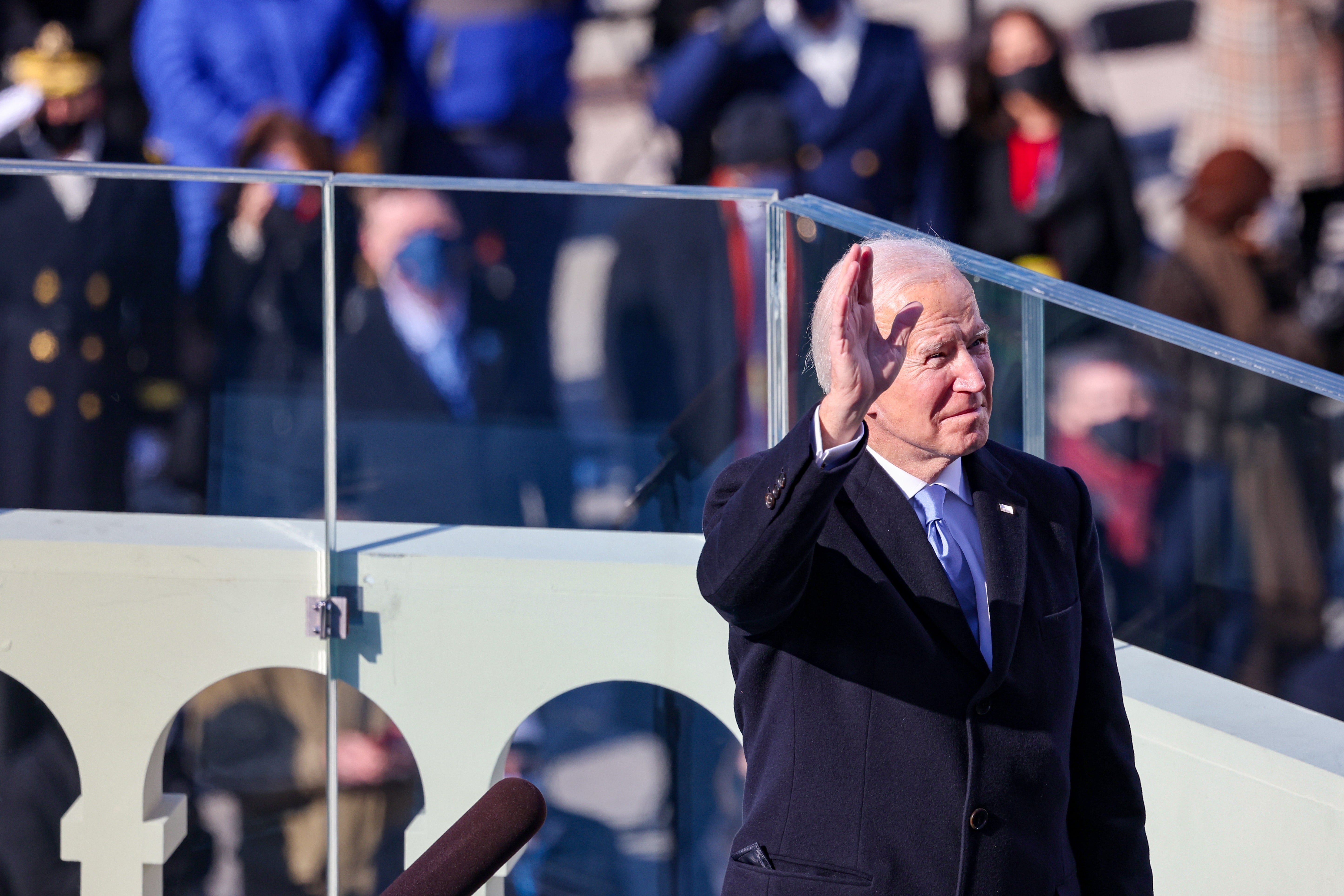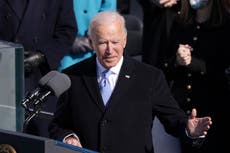Coming in from the cold: How Biden plans to reset US foreign policy
‘There is a big difference in attitude between Trump’s administration and this one’, a senior Iranian official, who was part of the nuclear deal negotiations, tells Kim Sengupta


Donald Trump began attempts to dismantle the international legacy of Barack Obama soon after arriving at the White House, and ended his turbulent presidency seeking to place roadblocks in the path of Joe Biden’s foreign policy.
Trump sought to sabotage one of Obama’s landmark achievements by reneging on the Iran nuclear deal and imposing punitive sanctions on Tehran. Israel and Saudi Arabia, meanwhile, were given carte blanche on a range of issues, from Palestinian rights to the war in Yemen.
Trump alienated America’s western European partners with constant attacks on the European Union and Nato while appearing loth to criticise Vladimir Putin’s Russia. Having threatened to destroy North Korea, Trump allowed Kim Jong-un to continue developing his arsenal of missiles. He started a trade war with China, but also weakened ties with key allies in the region, such as Japan and South Korea.
The Trump version of “America First” also meant pulling out of a raft of multilateral treaties, from the Paris Climate Accord to trade agreements like the Trans-Pacific Partnership (TPP) and the North American Free Trade Agreement (Nafta), and threatening to pull out of the World Health Organisation (WHO) in the middle of a devastating pandemic. As Trump’s term in office ended in accusations and recriminations, his secretary of state, Mike Pompeo, declared in the space of four days that the Houthis in Yemen – allies of Iran – are a terrorist linked organisation; claimed that al-Qaeda had set up a new base in Iran; designated Cuba a state sponsor of terrorism; and extended diplomatic contacts with Taiwan, thus further inflaming relations with China.
So how will the Biden administration seek to achieve their foreign policy goals? Jake Sullivan, the new national security adviser, is clear that “the strategy is, go fast, be bold. [Biden’s] not thinking on a two-year time frame; he is thinking on a first-few-months time frame.” Chuck Hagel, defence secretary under Obama, told Foreign Policy magazine: “What Biden has to do goes well beyond the first 100 days. He is going to have to move immediately to rebuilding, restoring our alliances, reassuring them that America is back in the game to lead ... We’ve never been in this situation before, domestically and internationally.”
One of the most immediate issues facing the Biden administration is the Iran nuclear deal, the JCPOA (Joint Comprehensive Plan of Action), which the other international signatories – Britain, France, Germany, Russia and China – have kept afloat in the face of intense US pressure. Last September, during the presidential election campaign, Biden said: “I will offer Tehran a credible path back to diplomacy. If Iran returns to strict compliance with the nuclear deal, the United States would rejoin the agreement as a starting point for follow-on negotiations.”
Antony Blinken, the new secretary of state, said at his Senate confirmation hearing that Trump’s breach of the deal has succeeded in making Iran “more dangerous ... Iran’s breakout time, which was under the nuclear deal, is only three or four months today.” He also said that the assassination on Trump’s orders of Qassem Soleimani, the commander of the Iranian Revolutionary Guards, has left America a “less safe place”. Blinken said the JCPOA would be a “platform” for a “longer and stronger agreement” that would include other issues, including Tehran’s missile programme and military activities in the region. There have been indications from the Biden team that some sanctions imposed on Iran and its allies under Trump, such as the terrorist designation against the Houthis and others, which are hampering humanitarian supplies, will be lifted quickly.
Iran, however, has insisted that the US must stick to the JCPOA, which focused on its nuclear programme, and cannot introduce additional factors such as the missile programme.
On the morning of Biden’s inauguration, Iran’s president, Hassan Rouhani, celebrated Trump’s departure at a televised cabinet meeting, declaring that a “tyrant’s era came to an end and today is the final day of his ominous reign”. Trump’s political career, he continued, “has died, but the JCPOA is alive. He did all he could to destroy the JCPOA but could not: the ball is now in America’s court.” The foreign minister, Mohammad Javad Zarif, said: "Mr. Biden should know that his responsibility is to lift these sanctions.”
A senior Iranian official who worked on negotiating the nuclear deal with the then US secretary of state, John Kerry, told The Independent that, in his view, there would be a lot of “rhetoric” from both sides for the time being. However, he wanted to stress that “the big difference is that Mr Trump wanted to destroy the JCPOA, trying to find any excuse to destroy it. Mr Biden was the deputy to a president under whom the JCPOA was signed. It was a big achievement and we think he will return to it. This may not happen immediately, but it will happen. There is a big difference in attitude between Trump’s administration and this one.”
One issue where there may not be such a big difference between the two administrations is China. At the Munich Security Conference last year, at a time when the US was pressuring Boris Johnson’s government to reverse the decision to allow the Chinese multinational Huawei into the UK’s 5G network, the Republican senator Lindsey Graham said: “Nancy Pelosi and Donald Trump are not going to have many dinners together, but if you ask them about the British purchase of Huawei they will give you the same answer. We are very firm in our commitment – Republicans and Democrats – that if you go down the Huawei road you are going to burn a lot of bridges.”
Pelosi, the Democrat speaker of the House of Representatives, in turn warned Britain and other European countries about malign Chinese influence, and not to choose “autocracy over democracy”. Biden will inherit Trump’s trade war with China. He told The New York Times last month that there would be no immediate lifting of tariffs on Beijing. The new president had spoken at length about protecting American industry and commerce from intellectual property theft and unfair trading practices. Senior members of the Biden team have been critical of China on human rights, with Sullivan accusing Beijing of crushing the wishes of the people in Hong Kong and pledging to stand “united with our allies and partners against China’s assault on Hong Kong’s freedoms, and to help those persecuted find safe haven.”
Blinken has stated: “Let me just say that I also believe that President Trump was right in taking a tougher approach to China ... I disagree very much with the way that he went about it in a number of areas, but the basic principle was the right one, and I think that's actually helpful to our foreign policy.” Blinken spoke of working with partner states to counter China. Kori Schake, director of foreign and defence policy studies at the American Enterprise Institute, held that “cajoling America's allies into alignment to manage a rising China together” should be a priority for the new administration.
Schake said that because “the Trump administration pitched so many needless fights, including over US troops in Japan, South Korea and Germany and national security tariffs on Canada and the European Union, [it] will be an enormous challenge for President Biden and his team to reset those relationships back into effective and cooperative patterns.” However, there have been strong signals from international allies, especially in western Europe and east Asia, that they want relations to be strengthened quickly. The US rejoining multilateral economic, environmental and health organisations, as Biden has pledged to do, should help in this process.
One country with which a reset may not happen quickly is Russia. There remains deep resentment among Democrats about Kremlin interference that supposedly helped Trump to the White House in the 2016 election. The Biden team will have a number of experienced Russia specialists such as Victoria Nuland and Andrea Kendall-Taylor taking up key positions in the State Department and National Security Council who are likely to take a more robust stance towards Moscow. There are likely to be changes in approach to a number of American allies in the Middle East.
The strategy is, go fast, be bold. He’s not thinking on a two-year time frame, he is thinking on a first-few-months time frame
Trump’s foreign policy has often been marked by arbitrary actions against the advice of senior diplomats and military officers. One of the most contentious of these was his sudden decision to pull US troops out of Syria, a move that not only left a security vacuum for pervading Russian and Iranian influence, but abandoned the Kurds – staunch allies in the war against Isis – and gave Turkey’s president, Recep Tayyip Erdogan, the green light to send forces across the border and attack them. Biden has called Erdogan an “autocrat” and demanded that the Turkish leader “pays a price” for his actions towards the Kurds. He has also suggested that the US should consider supporting the Turkish democratic opposition. The activities of the Turkish president, who acted with relative immunity under Trump, are likely to receive greater scrutiny with the new administration.
The same is likely to be the case with Saudi Arabia, which signed arms deals with the US under Trump worth $350bn (£256bn) over 10 years. The Saudi crown prince, Mohammed bin Salman, has received a degree of protection from Washington on a number of issues, including the murder of journalist Jamal Khashoggi, the jailing of human rights activists, and the Yemen war. This could soon change; according to Avril Haines, Biden’s pick for national intelligence director, the new administration may declassify an intelligence report into Khashoggi’s murder, meaning the US is likely to officially assign blame to the crown prince.
Biden has described Saudi Arabia as a “pariah state”, with a government that has “very little social redeeming value”. In reality, a US president is unlikely to cut the Saudis adrift, and Riyadh, in turn, has dramatically stepped up their efforts to reach out to the Biden team. It has also taken major conciliatory steps: ending the confrontation with the Qataris, who had been cultivating the Democrats, and announcing that from next month they would cut oil production by a million barrel a day – a move that sent shares of US energy companies soaring.
There is unlikely to be any major change of policy towards Israel. Biden has praised the normalisation of relations between Israel and the United Arab Emirates, Bahrain, Morocco and Sudan as a “historic step to bridge the deep divides of the Middle East” and the president has a record of backing Israel in Congress. There is likely to be, however, much more of an emphasis on Palestinian rights – something the Trump administration ignored, more or less. Biden has stressed that Israel “has to be prepared to work toward a genuine two-state solution”, and he will expect movement on that. Gestures to reassure the Palestinians that they have not been forgotten are in the pipeline, such as reopening US consulates in east Jerusalem and the PLO mission in Washington. But the US embassy, by all accounts, will stay in Jerusalem rather than be moved back to Tel Aviv.
Biden returns to an international landscape much changed since he left as Obama’s vice president. He will be doing so as the leader of a fractured, bitterly divided nation. It remains to be seen how long it will take America to regain its position of leadership after four years of Trump.



Join our commenting forum
Join thought-provoking conversations, follow other Independent readers and see their replies
Comments